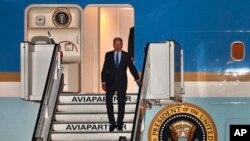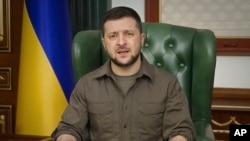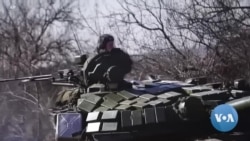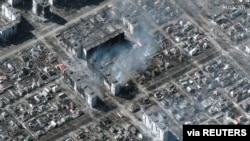U.S. President Joe Biden arrived Wednesday in Brussels where he will meet with NATO and European allies and is expected to announce a new round of sanctions against Russia for its invasion of Ukraine.
"He will join our partners in imposing further sanctions on Russia and tightening the existing sanctions to crack down on evasion and to ensure robust enforcement," White House National Security Adviser Jake Sullivan said on Tuesday.
At a news conference Wednesday in Brussels, NATO Secretary-General Jens Stoltenberg said Russia's war on Ukraine presents "a new normal for our security" and that alliance leaders are likely to announce more support for Ukraine at Thursday's NATO summit.
"I expect leaders will agree to strengthen NATO's posture in all domains with major increases of forces in the eastern part of the alliance, on land, in the air and at sea," Stoltenberg said.
"The first step is the deployment of four new NATO battle groups in Bulgaria, Hungary, Romania and Slovakia," Stoltenberg said.
The alliance chief said NATO leaders are also set to announce an agreement to address nuclear, chemical and other threats from Russia.
"I expect allies will agree to provide additional support, including cybersecurity assistance as well as equipment to help Ukraine protect against chemical, biological, radiological and nuclear threats," he said.
Ukrainian President Volodymyr Zelenskyy is due to virtually address Thursday's NATO summit, and he said ahead of the meeting that he is expecting Western leaders to both add to their Russian sanctions and pledge more aid for Ukraine.
One key Russian industry that has been discussed for possible sanctions is the country's lucrative oil and gas exports, but reliance on those supplies, particularly among European Union nations which get 40% of their gas from Europe, has raised concerns about the effects of such actions.
German Chancellor Olaf Scholz said Wednesday that his country would "end this dependency as soon as possible," but that doing so immediately "would mean to push our country and the rest of Europe into recession."
Meanwhile shelling continued Wednesday in Kyiv, including attacks that injured four people in the Ukrainian capital. In the city of Chernihiv, Russian forces destroyed a bridge that had been used for evacuating civilians and delivering aid.
The United Nations says more than 3.6 million refugees have fled Ukraine since Russia launched its invasion one month ago. Another 6.5 million people have been displaced from their homes within the country.
U.S. officials said Tuesday that in some parts of the country, the momentum in the conflict appears to be shifting.
"We have seen indications that the Ukrainians are going a bit more on the offense now," Pentagon press secretary John Kirby told reporters late Tuesday.
Stoltenberg told reporters the Ukrainian military's resilience is the result of the determination of Ukrainian people and a military that is stronger than it was when Russia invaded and annexed Crimea eight years ago.
"The Ukrainian armed forces today, it's much bigger, much better equipped, much better trained, much better commanded. They have much better logistics than they had back in 2014," Stoltenberg said.
"And, of course, all of this combined with the courage. The high morale is the reason why they are really able to push back and to stand up against the much bigger Russian invasion," the NATO chief added.
Watch related video by Henry Ridgwell:
A NATO official who was speaking on condition of anonymity to discuss intelligence told reporters Wednesday that between 7,000 and 15,000 Russian soldiers have been killed in Ukraine.
The official said Russian forces have achieved "almost none" if their strategic objectives, while noting "they are stalled" in the northern cities of Kyiv, Kharkiv and Chernihiv.
Russia is "achieving more results in the south but the price is horrendous," the official said.
On its English-language Telegram feed, Russia's Ministry of Defense portrayed a vastly different war effort, praising Russian forces as they advanced on parts of southeastern Ukraine while Ukrainian forces fled, and claiming success in taking out Ukrainian fuel depots and positions with "high-precision long-range" weapons.
A senior U.S. defense official, briefing reporters Tuesday on the condition of anonymity in order to discuss intelligence, confirmed Russian ships in the Sea of Azov had begun shelling the Ukrainian city of Mariupol, which has been under heavy fire for days.
But the official said other intelligence suggests Russia's invasion of Ukraine has become a logistical nightmare, with Russian forces still struggling to overcome shortages of fuel, food and precision-guided munitions.
The United States, meanwhile, warned Russia is increasingly taking out on civilians its inability to achieve its objectives in Ukraine.
"Clearly, there are civilian casualties, and clearly, they're mounting every day because of the indiscriminate attacks that the Russians are conducting … as they become more frustrated," Kirby told reporters Tuesday.
"We believe we should call it like we see it, and we believe that there are war crimes being conducted by the Russian forces," he added.
Russia has repeatedly rejected accusations of war crimes, even as the U.S. and other Western countries raise concerns that Russia may be preparing to use chemical and biological weapons in Ukraine, or even nuclear weapons.
"If it is an existential threat for our country, then it can be used in accordance with our concept," Kremlin spokesman Dmitry Peskov told the U.S.-based cable news channel CNN Tuesday when asked whether Moscow might consider unleashing some of its nuclear arsenal.
Stoltenberg said Russia "should stop this dangerous irresponsible nuclear rhetoric" and warned of "our readiness to protect and defend allies against any threat anytime."
National Security correspondent Jeff Seldin and U.N. correspondent Margaret Besheer contributed to this report.
Some information came from The Associated Press, Agence France-Presse and Reuters.









